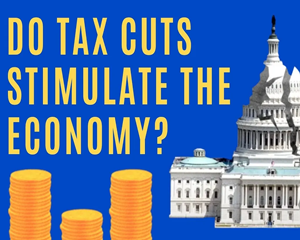(单词翻译:单击)
When President Ronald Reagan began his first term in 1981, the US economy was struggling.
当罗纳德·里根总统在1981年刚上任时,美国的经济情况岌岌可危。
Unemployment rates were high and getting higher, and in 1979, inflation had peaked at an all-time high for peacetime.
失业率越来越高,1979年,通货膨胀达到和平时期的历史最高点。
In an effort to combat these issues, Reagan's administration introduced a number of economic policies, including tax cuts for large corporations and high-income earners.
为了解决这些问题,里根政府推出了一系列经济政策,包括对大企业和高收入者的减税。
The idea was that tax savings for the rich would cause extra money to trickle down to everyone else,
这个想法是,富人减税省下来的钱将导致额外的钱流向其他所有人;
and for that reason, these policies are often referred to as trickle-down economics.
因此,这些政策被称为下渗经济学。
From the 80s to the late 90s, the US saw one of its longest and strongest periods of economic growth in history.
80年代到90年代后期是美国历史上最长和最强势的经济增长时期之一。
Median income rose, as did rates of job creation.
平均收入和就业机会增长。
Since then, many politicians have invoked trickle-down theory as a justification for tax cuts
从那以后,许多政治家使用下渗经济作为减税的理由,
but did these policies actually work, either in the sense of stimulating economic growth, or in terms of improving circumstances for Americans?
不过这些政策真的有效吗,它们真的能刺激经济增长或者提高美国人的经济现状吗?
Would they work in other circumstances?
在其他情况下,这些政策有用吗?
To answer these questions, the main things to consider are whether the impact of the tax cut on the government's tax revenue is harmful,
为了回答这些问题,我们应该考虑减税会不会对政府的税收产生负面的影响,
whether the money saved in taxes actually stimulates the economy, and whether stimulating the economy actually improves people's lives.
省下的税款到底有没有刺激经济,还有刺激经济真的可以提高人们的生活水平吗?
The idea behind tax cuts is that if taxes are too high, people will be less willing to work, which would ultimately decrease tax revenue.
减税背后的理念是,如果税收太高,人们想要工作的意愿就会降低,这就会导致税收的降低。
So at a lower tax rate, the government might actually gain more tax money that it can theoretically put towards improving life for its citizens,
所以在低税率的情况下,政府可能会得到更多的税收,理论上会用来提高人们的生活水平,
because people will work more when they get to keep more of their earnings.
因为当人们能留下更多收入时,他们会更加努力工作。
Of course, there's a limit to how much the government can cut taxes: at a zero tax rate there is no tax revenue regardless of how much people are working.
政府能减税的程度是有限的:在零税率的情况下,不论人们的工作量,都是零税收。

So while cuts from a very high tax rate might be fine,
在税率高的情况下,减税可能是合理的,
cuts from a lower tax rate might be counterproductive, hampering the government's ability to accomplish crucial things.
但在税率高的情况下,减税可能产生反效果,妨碍政府完成关键政务的能力。
Tax rates were extremely high when Reagan took office.
里根就职时的税率是很高的。
His administration cut the highest income tax bracket from 70% to 28% and corporation tax from 48% to 34%.
他的政府将最高收入税率从70%降至28%,企业税从48%降至34%。
By comparison, as of early 2021, those rates were 37% and 21% respectively.
相比之下,2021年初,这两项税率分别是37%和21%。
When tax rates are lower, tax cuts for the wealthy can be harmful.
当税率较低时,对富人减税可能是负面的。
For example, in 2012 to 2013, lawmakers cut the top tax-rate in the state of Kansas by almost 30% and reduced some business tax rates to zero.
例如,在2012年至2013年,议员将堪萨斯州的最高税率降低了近30%,并将一些企业的税率降到零。
As a result, the government's balance sheet immediately fell into negative territory and did not recover,
这导致了政府的资产负债表立刻跌为负数,并且没有恢复成正数,
implying that wealthy individuals and companies did not invest back into the economy.
这意味着有钱人和企业没有把钱投资回经济中。
In short, the money did not trickle down.
总之,财富没有下渗。
This appears to be a trend: in a study over multiple periods of history and across 18 countries,
这看来是一种趋势:在一项跨越了18个国家和多个历史时期的研究中,
The London School of Economics found that cutting taxes increased the wealth of the top 1% of people, but had little effect on the economy as a whole.
伦敦经济学院的研究发现减税增加了最顶端1%人的财富,对整体的经济没有什么影响。
In order for tax cuts for the rich to truly stimulate the economy,
为了让富人的减税能够真正刺激经济,
they would have to spend the saved money putting it back into, for example, local businesses -- but this isn't what happens in practice.
他们需要将省下的钱投入回经济,比如投资当地的企业,但实际情况并非如此。
No economic policy operates in isolation: each time and place is unique with multiple policies in place simultaneously,
没有任何经济政策是独立运作的:每个时间和地点都有多项特殊的政策同时进行,
so there is only ever one test case for each set of scenarios.
因此,每组情况只有一个测试案例。
This makes it difficult to deliver definitive rulings on whether an economic policy worked,
这使得我们很难对以下问题作出明确的裁决:某项经济政策是否有效、
whether something else might have worked better, or whether it would work in a different situation.
其他政策是否会更好地发挥作用、或在不同情况下是否会发挥作用?
And yet, rhetoric around trickle-down economics, both during the Reagan era and since, often promises something definitive:
无论是围绕在里根时代和之后关于下渗经济的言论,往往承诺一些绝对的东西:
that spending by society's richest members on things other than taxes directly improves the financial circumstances of the less wealthy.
社会上最富有的人们在交税以外其他方面的支出,会直接改善穷人的财务状况。
And there's not much evidence to support that.
但没有足够的证据来证明这一点。


